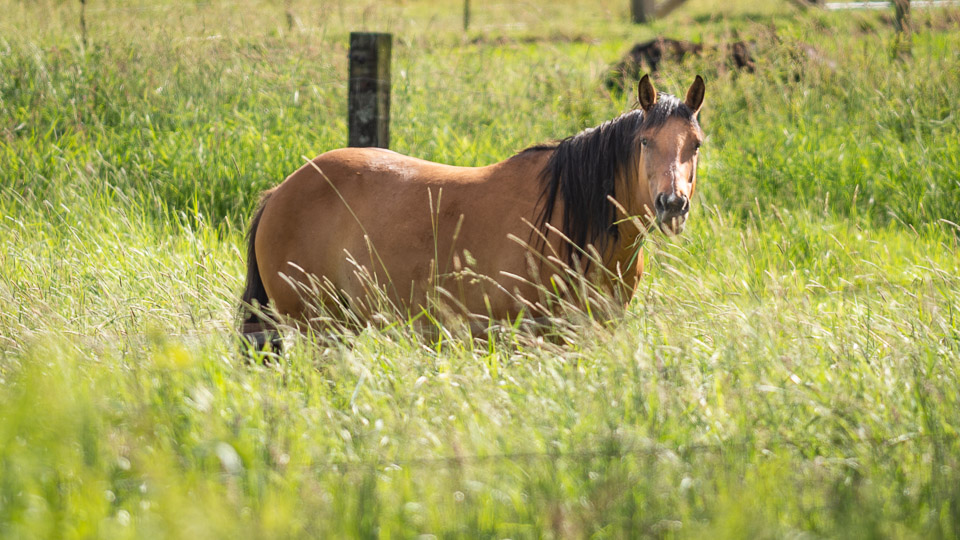
Horse Nutrition – An Introduction
There are two things to be said about nutrition in horses. The first is to feed horses the way they were created to eat. The second is that no one remembers how they were created to eat.
Ask yourself this. Who taught you how to feed? Then ask, who taught them? And who taught those people? Until you go back about 50 years you won’t find out how horses were fed when most of us didn’t have hay and none of us had sweet feed.
With almost 50 years working with horses (I started 1973), I have been able to see nutrition move from simple feeding of a few things to feeding thousands of different feeds and supplements all geared towards a specific point in the horse’s life. I have also watched horse owners fall into the belief that these companies are working hard for our horses. They are not.
Did you know the interstate system of roads was not started until 1960? There were few farmers with tractors until the late 1950’s and before this, hay was made using horses. To rephrase this, if you wanted hay 75 years ago you hooked up your field horses and went out mowing. We often picked up the hay and stacked it by hand. There were few farmers with self propelled baling machines. Only the wealthy had baled hay brought to their farm and stacked in the mow. There were no feed stores you could call for delivery of hay and bags of grain delivered and stacked neatly in your barn in 1973. We got our oats delivered by train in a box car. The day bags were delivered by a semi truck was a day to remember!
Think about senior feeds. When is a horse considered a senior? If we walked in the woods all day would we ever find senior feed for squirrels? If we stopped in a restaurant would there be senior feed for us (not the senior menu but foods designed for senior humans)? No because this is a marketing gimmick.
Think about low starch food for horses. If I offered you a plate with a donut, a plate with half a donut and a plate with no donut, which would be the low starch donut? Correct! The plate with no donut! So if you want to reduce the amount of starch you feed your horse just cut in half (or more) what you are feeding. The low starch feeds are filled with inflammatory ingredients so the “scoop” you use will still be full but it will have less starch. Marketing at its finest.
In the last 20 years I have seen an explosion of lameness (especially suspensory injuries) as well as obesity, insulin resistance and Cushing’s disease in the horses I visit. With sadness I also see a lot of misunderstanding of what the cause of these issues are. In a world of human and veterinary “Whack-A-Mole” medicine, the practitioner reacts to a disease with treatments and medications. The horse owner also reacts with supplements and elixirs in hopes of curing. The farrier reacts with special shoes and the other horse professionals proliferate with alternative therapies all trying to cure the horse.
In reality, the horses are reacting to what you are feeding them. Look at these topics and invest your time here because if you want to keep your horse sound and disease free you will need to feed them as they were made to be fed. They are not humans, dogs, cattle or any other animal on this planet as far as their digestive tract and their food needs are concerned. Actually there are only 2 other groups of animal similar to the horse in digestion: the tapir and the rhinoceros. Dig in here for more information on the nutrition of the horse.
This is a 45 minute overview of nutrition in horses to get you started. And remember that with a membership (coming soon) you have access to the Horsemanship Nutrition Course to dig in and get tested on what you have learned.
Use the browser back button or menu to return to the index of topics.
A Question About Soybeans
The objections to using soybean meal in horses as a protein source are addressed here: GMO, glyphosate, feminization. How SBM is made and my conclusions are here too.
Betrayal
We are told to trust the experts mainly because we cannot be all experts in everything. We need to become experts in how to feed horses because how they are being fed is hurting them in every area of health.
Carbohydrate Dependency – Decomplexicating Equine Nutrition Part 6 of 12
Feeding sugar every day in excess of horse’s needs creates a dependency no different than drugs and alcohol. This blog explains why.
Cheating On The No Grain Diet
I need to come clean with all of you. I have been cheating on the no grain diet. Please forgive me but I and Melissa have been put into an impossible position. Tis the season of sugary treats offered by grateful clients..
Cheese Doodles, Chocolate Bars and Candy Won’t Hurt You
When is it OK to eat sugar? Enjoy this comical video which basically explains how sugar is necessary for body functions and is OK even in abundance at certain times.
Chronic Protein Deficiency In Horses
An introduction to the biggest health issue in horses today. Due to modern feeding, horses are consuming their own protein PLUS they are being fed enough high quality protein.
Chronic Protein Deficiency In Horses – HorseTalk
Chronic protein deficiency in horses is at the root cause of many injuries and illnesses I see in horses. This 2016 video presentation is from my HorseTalk™ series of webinars.
Complexicate
Horses are becoming too complicated to keep as I watch everyone try to better others as to why their theories are better. So I made a new word – complexicate – to describe this phenomenon.
Constantly At War
In every moment of life in our horses, there is a battle between the body and the invading organisms surrounding them. To win, the immune system needs to be calm and in good condition.
Decomplexicating Equine Nutrition – Introduction
Complexicate – to complicate things to make people look more intelligent and feel more significant and usually agenda based. I decomplexicate horse feeding.
ECEIM Consensus Statement On Equine Metabolic Syndrome
The European College of Equine Internal Medicine (ECEIM) issued a statement on a problem affecting horses called Equine Metabolic Syndrome. I summarize it here.
Feeding Horses – The Frequently Asked Questions
The most frequently asked questions about feeding horses asked in emails, comments and in social media. These equine nutrition questions are the bare essentials.
Feeding Salt To Horses
All horses need salt but what is it, why do they need it and how do we get it in them? Is a lick enough or should it be added to the food? Can excess salt inflame the gut in horses? What about electrolytes?
Feeding Senior Horses
When do horses become “seniors?” Why have I never found “senior feeds” for squirrels or other wild animals? Could “senior feeds” just be a marketing gimmick? Time to take a look.
Feeding The Horse As Simple As 1-2-3
This is for horse owners who just want to know how to feed horses in a simple action set. Step 1) stop inflammation, Step 2) add protein, Step 3) write it all down.
Foal Diseases – Developmental Orthopedic Disease
Degenerative Orthopedic Disease
Foal Diseases – Epiphysitis
An excerpt is coming soon.
Food Does Not Equal Love
The purpose of eating is to survive. How sugars are used, the development of uric acid and the association of disease in horses is discussed and a solution offered. The sign here is wrong.
GMO, Pesticides and Fertilizers – Decomplexicating Equine Nutrition Part 9 of 12
An objective discussion about feeding horses with GMO foods treated with pesticides and herbicides. Why to worry and why we should not worry.
Grazing Not Browsing -Decomplexicating Equine Nutrition Part 1 of 12
All equids graze ground plants. They avoid taller plants with more woody cellulose (lignin). Ruminants browse eating short and tall plants.
Gut Inflammation – Decomplexicating Equine Nutrition Part 4 of 12
The digestive tract of the horse has a 1 cell thick lining with an army of defense cells behind it. Attacks on this cause the immune system to respond.
Gut Microbes – Decomplexicating Equine Nutrition Part 3 of 12
You are not feeding the horse but you are feeding the trillions of microbes within their gut and they, in turn, feed the cells of the horse. Happy gut microbes = healthy horse.
Honesty – A True Story
When the words of this man I met settle into your consciousness you will either be shocked or say that this is the problem with the world (and our horses) today. I personally became speechless.
Hormesis, Hay And Horses
Hormesis is the cellular process of resting which helps to clean up cellular debris, remove damaged cells and help the mitochondria switch their fuel source (mitochondrial flexibility). Critically important.
Horse Metabolism And Hormones – Anhidrosis (Non-sweating)
No one has determined why some horses in the same environment stop sweating while others do sweat but we know that every horse is different with different responses to triggers. And no one (to my knowledge) has determined the mechanism behind anhydrosis.
Accidentally we have found a cure that seems to work in every horse we try it with and we need your help to give us more examples of this treatment’s success.
Horse Nutrition – Body Condition Score
The Henneke horse body condition score was published by a professor at Texas A&M University in 1983 and is named after him. He wanted to use a simple system for horse owners to score the body condition of their horses. It has become popular and used widely.
Horse Nutrition – Carbohydrates (Sugar)
Carbohydrate is a word that describes sugar. Other words include saccharide, monosaccharide, disaccharide, polysaccharide, glycogen, starch, cellulose, soluble fiber, non-soluble fiber, structural carbohydrate and non-structural carbohydrate. All sugar is made up of the same 3 elements: carbon, hydrogen and oxygen. Glucose and fructose are both C6 H12 O6 but glucose has a ring of 6 carbons and fructose is a ring of 5 carbons. This is incredibly significant in how the body uses these sugars with fructose more efficient in creating body fat and exhausting the cell to the point of death.
Horse Nutrition – Concentrate Feeds
Concentrate rations are the opposite of forage for horses. They developed a while ago when people moved from the country farms to the industrialized cities. In order to feed these people, horses worked more to harvest more food for the increasing demand. Less farmers had to do more with their horses which caused weight loss in the horses because 1) increased work and 2) decreased pasture time. The solution was to feed them more sugar (glucose) in the form of grain (starch).
Horse Nutrition – Fats
It is not necessary to feed a fat source or supplement to horses. The reason for this is based on understanding what a fat is and where the horse gets fat in a field of grass.
Horse Nutrition – Feed By Weight, Not Volume
Horse owners feed by volume which most will call a “scoop.” This is irrational. If we all decided to pick one size for a “scoop,” would that “scoop” of feathers weigh as much as a “scoop” of rocks? Obviously not. The density of the two are not the same. It would take a lot of “scoops” of feathers to weigh the same as 1 “scoop” of rocks.
Horse Nutrition – Feeding Signs
Feeding signs I have seen at horse farms.
Horse Nutrition – Ground Plants
Horses are one of 3 groups of animals with similar digestive tracts in the world. Beside all equids (horses, asses and zebras), the other two are the tapir and the rhinoceros.
Horse Nutrition – Growing Horses
Foals at some point transition from nursing mother’s milk to eating solid food. This is normal but sometimes some problems can occur.
Horse Nutrition – Hay
Hay is last summer’s grass. It is a new supplement and it could also be called the original supplement. The purpose of hay is to add calories to the diet when winter is hard on the horses. Adding hay in winter to sustain life is why it was created. Adding hay when there is no pasture (drought, lack of pasture) is an inadequate substitute for fresh and healthy pasture. Here is why.
Horse Nutrition – Lectins
Lectins are found in the outer coverings of seeds, fruits and leaves of all plants. Animals have adapted to these toxins in many ways. Horses have limited their diet to ground plants and have come to terms with their defense mechanisms.
Horse Nutrition – Minerals And Electrolytes
Minerals and electrolytes in horses are elements (atoms) that are NOT carbon, hydrogen, oxygen and nitrogen. They include the macro-minerals of calcium, phosphorus, potassium, magnesium, sodium, chloride and sulfur. They also include the micro-minerals (trace minerals) of copper, zinc, selenium, iron, and others.
Horse Nutrition – Physiology
Knowing how nutrition works in the horse down to the cellular and molecular level is important. You may not think so or you may not feel capable of understanding the complexities. If you try you will not only help your horse thrive, you will also save a lot of money!
Horse Nutrition – Proteins
There are about 35,000 DIFFERENT proteins in every cell of our bodies and about 1 to 3 BILLION total proteins in each cell. Protein is important.
Horse Nutrition – Supplements
I don’t believe in any supplement for horses unless there is a deficiency. With the exception of starvation, mineral and vitamin deficiencies are rare in horses.
Horse Nutrition – Top Line Score
The Top Line Score came out in other animals, primarily meat animals (hogs, cattle), as a way to determine how much meat was on the hoof. And ultrasound machine would be scanned over the backs of hogs and the back fat was measured as well as the depth of meat. No one dares do this in horses as this would ruin the horse feeding industry. This is why.
Horse Nutrition – Treats
Most treats fed to horses are not only filled with inflammatory ingredients but are fed for the wrong reason.
Horse Nutrition – Water
Most people don’t “think” about feeding water – they just do it. Water, along with air, is more important than food as removing either will bring death within a minute to a few days
Horse Nutrition – Weight Control
I see weight control as two issues in horses. Either the horse remains underweight no matter how much they are fed or the horse remains overweight no matter how much restriction is applied to the diet. Weight needs to seen as both body fat and as muscle mass. Both are important for health but have different purposes.
How Long Do I Need To Feed Soybean Meal To My Horses?
Soybean meal is a high quality protein for horses lacking it in their environment and from the chronic loss through auto-digestion in high sugar diets. Balancing this is key.
Lectins
Lectins are plant proteins developed by plants to protect their seeds from being eaten and killed by animal digestion. They cause autoimmune disease, leaky gut syndrome and hormonal disruption, etc.
Lectins – Decomplexicating Equine Nutrition Part 11 of 12
Lectins are plant proteins made to discourage animals from eating their seeds by making the animals sick. Insidious over years, they confuse the other causes of disease.
Mineral Deficiency In Horse Hay And Pasture
Minerals are elements necessary for life. Horses get their minerals from their environment. This discusses deficiencies, excesses and regulation of minerals.
Mitochondria and Making Energy – Decomplexicating Equine Nutrition Part 5 of 12nut
Inside every car is an engine needing fuel and inside every cell of your horse are engines called mitochondria. They both need maintenance.
No Sweat!
Horses living in climates with high temperatures and high humidity are often affected by anhidrosis (non-sweating). This is a highly effective cure that costs nothing and works in 3 to 4 days.
Nutrition In Horses – a HorseTalk™ Webcast
Feeding horses has been learned from someone in your past. But who taught them? And who taught them? Through the chain of teacher – student the information has changed.


Responses